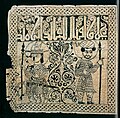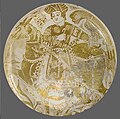Portal:Fatimid Caliphate
Introduction
The Fatimid Caliphate or Fatimid Empire (/ˈfætɪmɪd/; Arabic: ٱلْخِلَافَة ٱلْفَاطِمِيَّة, romanized: al-Khilāfa al-Fāṭimiyya) was a caliphate extant from the tenth to the twelfth centuries CE under the rule of the Fatimids, an Isma'ili Shia dynasty. Spanning a large area of North Africa and West Asia, it ranged from the western Mediterranean in the west to the Red Sea in the east. The Fatimids trace their ancestry to the Islamic prophet Muhammad's daughter Fatima and her husband Ali, the first Shia imam. The Fatimids were acknowledged as the rightful imams by different Isma‘ili communities as well as by denominations in many other Muslim lands and adjacent regions. Originating during the Abbasid Caliphate, the Fatimids initially conquered Ifriqiya (roughly present-day Tunisia). They extended their rule across the Mediterranean coast and ultimately made Egypt the center of the caliphate. At its height, the caliphate included—in addition to Egypt—varying areas of the Maghreb, Sicily, the Levant, and the Hejaz.
Between 902 and 909, the foundation of the Fatimid state was realized under the leadership of da'i (missionary) Abu Abdallah, whose conquest of Aghlabid Ifriqiya with the help of Kutama forces paved the way for the establishment of the Caliphate. After the conquest, Abdallah al-Mahdi Billah was retrieved from Sijilmasa and then accepted as the Imam of the movement, becoming the first Caliph and founder of the dynasty in 909. In 921, the city of al-Mahdiyya was established as the capital. In 948, they shifted their capital to al-Mansuriyya, near Kairouan. In 969, during the reign of al-Mu'izz, they conquered Egypt, and in 973, the caliphate was moved to the newly founded Fatimid capital of Cairo. Egypt became the political, cultural, and religious centre of the empire and it developed a new and "indigenous Arabic culture". After its initial conquests, the caliphate often allowed a degree of religious tolerance towards non-Shia sects of Islam, as well as to Jews and Christians. However, its leaders made little headway in persuading the Egyptian population to adopt its religious beliefs. (Full article...)
Selected articles
Did you know...
- ... that the last Fatimid caliph, al-Adid, came to the throne as a child, was dominated by his viziers, and died a few days after Saladin abolished the Fatimid regime?
- ... that Abd al-Rahim ibn Ilyas, heir apparent of the Fatimid Caliphate, was arrested after the caliph's death and died in captivity under unclear circumstances?
- ... that Abbas ibn Abi al-Futuh was a Zirid prince who became a vizier of the Fatimid Caliphate after assassinating his stepfather, and was overthrown after murdering caliph al-Zafir?
- ... that the memoirs of the eunuch chamberlain Jawdhar are one of the most important sources on the history of the Fatimid Caliphate in the mid–10th century?
Need help?
Do you have a question about the Fatimid Caliphate that you can't find the answer to?
Consider asking it at the Wikipedia reference desk or at the talk page of WikiProject Islam.
If you are interested in reading more about the Fatimid caliphate, some up-to-date summary books and encyclopedia articles are:
- Brett, Michael (2017). The Fatimid Empire. The Edinburgh History of the Islamic Empires. Edinburgh: Edinburgh University Press. ISBN 978-0-7486-4076-8.
- Daftary, Farhad (1999). "Fatimids". In Yarshater, Ehsan (ed.). Encyclopædia Iranica, Volume IX/4: Fārs II–Fauna III. London and New York: Routledge & Kegan Paul. pp. 423–426. ISBN 978-0-933273-32-0.
- Halm, Heinz (2014). "Fāṭimids". In Fleet, Kate; Krämer, Gudrun; Matringe, Denis; Nawas, John; Rowson, Everett (eds.). Encyclopaedia of Islam (3rd ed.). Brill Online. ISSN 1873-9830.
- Sanders, Paula (1998). "The Fāṭimid state, 969–1171". In Petry, Carl F. (ed.). The Cambridge History of Egypt, Volume 1: Islamic Egypt, 640–1517. Cambridge: Cambridge University Press. pp. 151–174. ISBN 0-521-47137-0.
- Walker, Paul E. (1998). "The Ismā'īlī Da'wa and the Fātimid caliphate". In Petry, Carl F. (ed.). The Cambridge History of Egypt, Volume 1: Islamic Egypt, 640–1517. Cambridge: Cambridge University Press. pp. 120–150. ISBN 0-521-47137-0.
- Walker, Paul E. (2018). "Fāṭimids". In Madelung, Wilferd; Daftary, Farhad (eds.). Encyclopaedia Islamica Online. Brill Online. ISSN 1875-9831.
Subtopics
Associated Wikimedia
The following Wikimedia Foundation sister projects provide more on this subject:
-
Commons
Free media repository -
Wikibooks
Free textbooks and manuals -
Wikidata
Free knowledge base -
Wikinews
Free-content news -
Wikiquote
Collection of quotations -
Wikisource
Free-content library -
Wikiversity
Free learning tools -
Wiktionary
Dictionary and thesaurus
This page was last updated at 2024-07-24 10:42 UTC. Update now. View original page.
All our content comes from Wikipedia and under the Creative Commons Attribution-ShareAlike License.




























